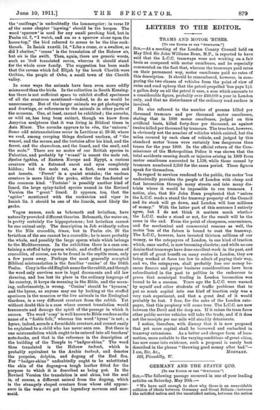LETTERS TO THE EDITOR.
TRAMS AND MOTOR 'BUSES.
[To THZ EDITOE OY THE " SPECTAT071.1 Sia,—At a meeting of the London County Council held on May 23rd Sir John Williams Berm, M.P., is reported to have said that the L.C.C. tramways were not working on a fair basis as compared with motor omnibuses, and he especially commented on the fact that, whereas the tramways paid rates on their permanent way, motor omnibuses paid no rates of this description. It should be remembered, however, in com- paring the two classes of vehicles from the point of view of rates and road upkeep that the petrol-propelled 'bus pays lid. a gallon duty on all the petrol it uses, a sum which amounts to a considerable figure, probably over 240,000 a year in London only, and that no disturbance of the ordinary road surface is involved.
He also referred to the number of persons killed per thousand tramcars and per thousand motor omnibuses, stating that in 1909 motor omnibuses, judged on this artificial basis, killed forty-four per thousand, as against twelve killed per thousand by tramcars. The true test, however, is obviously not the number of vehicles which existed, but the miles covered by each class of vehicle, and judged by this standard motor 'buses were certainly leas dangerous than trams for the year 1909. In the official return of the Com- missioner of the Metropolitan Police it was shown that the total accidents causing death or injuries arising in 1909 from motor omnibuses amounted to 1,139, while those caused by tramcars numbered 2,203 for the same period. These figures speak for themselves.
In regard to services rendered to the public, the motor 'bus undoubtedly provides the people of London with cheap and fast locomotion through many streets and into many dis- tricts where it would be impossible to run tramcars. I notice, also, that Sir John Benn prophesied that "unless the L.C.C. made a stand the tramway property of the Council and its stock will go down, and London will lose millions of money." With the latter part of this sentence I entirely agree, but I do not think it matters much whether the L.C.C. make a stand or not, for the result will be the same in the end. From the point of cheapness, convenience, and for mechanical and commercial reasons as well, the motor 'bus of the future is bound to oust the tramway. The L.C.C., however, have invested thirteen millions of our money, as the ratepayers of London, in one kind of traction which, once useful, is now becoming obsolete; and while no one denies that tramways have done excellent work in the past, and are still of great benefit on many routes in London, they are being worked at fares too low to admit of paying their way, and we, the ratepayers, shall probably lose our money be- cause finance and proper business considerations have been subordinated in the past to politics in the endeavour to prove that municipal trading in London locomotion was bound to be a success. Years ago the L.C.C. were warned by myself and other students of traffic problems that to put so much capital into one kind of traction only was a very rash experiment, and that a great deal of it would probably be lost. I fear, for the sake of the London rate- payer, that this prophecy will come true. The L.C.C. are now between the Devil and the deep sea. If it raises its tram fares other public service vehicles will take the trade, and if it does not the receipts per car mile will steadily deteriorate.
I notice, therefore, with dismay that it is now proposed that yet more capital shall be borrowed and embarked in tramway extensions. As a better and cheaper form of loco- motion, more suitable to the varying conditions of great cities, has now come into existence, such a proposal is surely best described in the phrase "throwing good money after bad."—










































 Previous page
Previous page